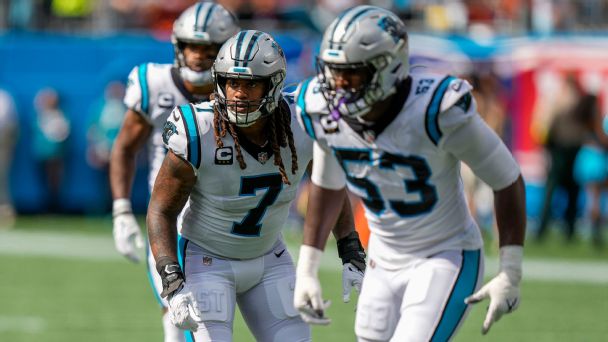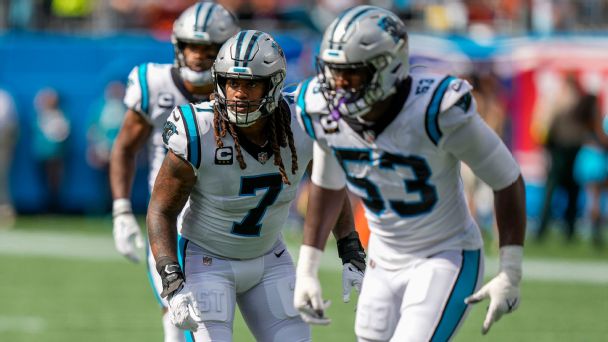
CHARLOTTE, N.C. — Carolina Panthers owner David Tepper understands he can’t buy the talent likely needed to build a Super Bowl-caliber roster this year given the team’s current salary cap limitations.
The billionaire also understands, as he said after making Frank Reich the sixth head coach in franchise history, there are no salary cap limitations on building a staff.
So as Reich turns his attention the next few months toward identifying players for free agency and the draft, he has a staff that understands what it takes to be a title contender thanks to Tepper’s deep pockets.
“He never flinched on that [no salary cap] statement,’’ Reich said earlier this week after completing most of his staff. “That doesn’t mean it’s been an open checkbook. That just means we’re willing to do what it takes to get the right coaches and put the right team together.
“We were able to compete against other teams who were vying for similar candidates.”
Reich was able to lure two former NFL head coaches to his staff in senior defensive consultant Dom Capers, 72, and senior assistant Jim Caldwell, 68.
Capers, the first head coach in Panthers history, helped the Green Bay Packers win a Super Bowl in 2010 as their defensive coordinator. Caldwell, a head coach with the Indianapolis Colts and Detroit Lions, helped the Colts (2005, assistant head coach and QBs coach) and Baltimore Ravens (2012, interim offensive coordinator and QBs coach) win titles.
The Panthers’ staff has won a combined 10 Super Bowl rings and has a combined 191 years of NFL coaching experience.
As much as Tepper has been criticized for past decisions — hiring Matt Rhule as his head coach in 2020 despite Rhule’s lack of NFL experience, not making interim coach Steve Wilks the full-time head coach after Rhule was fired in October, bailing on a new team facility in Rock Hill, South Carolina, after spending more than $175 million on the $800 million project — he’s delivered thus far with the new staff.
“Mr. Tepper’s involvement was not intrusive but was strong in the right way,’’ Reich said.
Capers compared the experience of the staff to the experience he put into the team’s initial roster that led to an expansion-record seven wins in 1995 and trip to the NFC Championship game in 1996.
“The staff sets the tone,’’ he said.
But for the Panthers to become a playoff team for the first time since the 2017 season, a lot has to happen.
Let’s take a look at what’s next:
Salary cap
For a team ranked in the lower half of the league in cap space, the place to start is linebacker Shaq Thompson. He’s set to count about $24.5 million against the 2023 cap. Carolina can save $13.16 million by cutting him or restructuring his deal to save that or more. Thompson, set to turn 29 in April, would be a nice fit at inside linebacker with Carolina switching to a 3-4 base scheme under new defensive coordinator Ejiro Evero and Capers. He also could be a luxury at that position.
Carolina could save another $3.61 million by cutting linebacker Damien Wilson and another $3.1 million by cutting tight end Ian Thomas. Giving edge rusher Brian Burns, set to count $16 million under the cap under his fifth-year option, an extension that would lighten the cap hit this year is a likely option. Wide receiver DJ Moore, with a $25.04 million cap hit this season, is a strong candidate for restructure to clear another $12 million or so.
Regardless, the cap will be tight. The good news is 18 of 22 starters are under contract.
Franchise quarterback
Carolina going hard initially after former Las Vegas Raiders quarterback Derek Carr is unlikely, according to a league source. The price is too steep. So it’s likely the Panthers look to re-sign free agent Sam Darnold or another veteran for a high-end No. 2 quarterback price ($8 million to $12 million range) and draft a quarterback with the No. 9 overall pick.
Don’t be surprised if they trade into the top three to assure they get their guy among Alabama’s Bryce Young, Ohio State’s C.J. Stroud and Kentucky’s Will Levis. The only quarterbacks under contract currently are 2022 third-round pick Matt Corral and 25-year-old journeyman Jacob Eason.
Tight end
Here’s perspective: Tight end Travis Kelce of the Super Bowl champion Kansas City Chiefs had 27 catches and four touchdowns in three playoff games. The entire Carolina tight end room had 50 catches for three touchdowns in 17 regular-season games.
The Panthers haven’t had a receiving threat at tight end since Greg Olsen caught 52 passes in 2019. Thomas, as good as he is as a blocker, hasn’t had more than 21 catches in any of the past four seasons. Tommy Tremble, who had three touchdowns on 19 catches last season, can fill Thomas’ role.
What Carolina needs is a Kelce-like threat. Dalton Schultz of the Dallas Cowboys, Evan Engram of the Jacksonville Jaguars and Mike Gesicki of the Miami Dolphins could be options in free agency. This also is a good year to get a tight end in the second or third round of the draft.
Interior defensive linemen
Edge rushers Burns and Frankie Luvu have a chance to thrive in the Panthers’ 3-4 scheme, as Kevin Greene and Lamar Lathon did for Carolina under Capers in 1996. Green had a league-best 14.5 sacks and Lathon was tied for second with 13.5. That’s another reason to extend Burns now; his price could go up after 2023.
The focus in free agency and the draft has to be on big men to eat up blocks. Tackle Derrick Brown, as Capers told ESPN.com, can fit into any scheme. Yetur Gross-Matos could fit in as an end in this scheme, but the Panthers need to add another big body or two to free Burns and Luvu to rush the passer.
Bozeman and Foreman
Carolina needs to re-sign center Bradley Bozeman and running back D’Onta Foreman. Both were a big part of a late-season surge that kept the Panthers in playoff contention. Both want to return, could likely be had for mid-range salaries and would take pressure off the quarterback.










